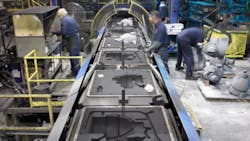Low-Cost Alternative for FNB Binder
Historically, PUNB technology has been absent from large-scale ductile iron production. The reason for this has been its relatively short mixed-sand working life. What is this? “Mixed sand working life” is the term for the specific period of time during which the binder-mixed-sand can be manipulated (packed, rammed, vibrated, etc.), before it begins to cure. An elongated range is critical for larger molds because of the time required to fill the mold and compact the loose sand. For this reason alone PUNB systems were found to be impractical.
This was unfortunate, though, because PUNBs have multiple inherently positive traits, and historically they have demonstrated an ability to produce the highest quality castings at the lowest total cost.
Elevated sulfur content at the mold-metal interface — especially with large safety critical castings — is a significant concern to producers. It can have a considerable effect on casting quality, in terms of both product integrity and surface finish.
Furan binders contain a considerable level of sulfur based on the use of sulfonic-acid catalysts. Therefore, particular attention must be paid to the sulfur content of both the catalysts and the reclaimed sand. Otherwise, a defect commonly referred to as “flake skin graphite” may develop, and lead to a poor, less ductile casting with surface integrity prone to cracking and failure in safety critical regions.
PUNB technology does not contain sulfur. So, using a long mixed-sand working life type PUNB significantly reduces the potential for this type of casting defect/failure.
An additional point of difference between PUNB and FNB binder systems concerns their respective chemical composition. PUNB systems are petroleum-based. Furan binders, on the other hand, are made from furfuryl alcohol, a raw material produced primarily in China from corncobs and other biomass. When comparing the two raw material sources, petroleum products have been a much more stable commodity, historically, and have exhibited half the volatility of furfuryl alcohol-based materials.
“Along with zircon and rare earth metals, the price of FA has been one of the most volatile raw materials in recent history,” explained Scott O. Hoertz, COO of ASK Chemicals. “This is due, in part, to fluctuating agricultural output in China as well as Chinese governmental price and tariff controls placed on this commodity material.”
Clearly, dependence on foreign raw materials creates significant uncertainty for manufacturers. Producers of larger ductile iron castings should recognize this best. For years, they have endured a purchasing system with highly volatile, monopolistic characteristics. Of course, raw material dependency creates this. Fortunately, there are now alternative choices.
Ultimately, PEP SET Patriot™may be the choice for you. Short-term costs certainly exist. For instance, a PUNB system requires a three-part pumping system and this minor investment must be taken into consideration.
However, the cost of converting to a three-part pumping system will be offset fairly quickly since the acidic nature of furan catalysts requires special corrosion-resistant pumps fabricated with Hastalloy C and other higher cost chemical-resistant materials. Over time, the production flexibility and reduced capital investment associated with using a single binder system for both cores and molds pays off handsomely.
However, in the end these decisions all depend on the manufacturers’ choice. Without the ability to make a choice of your own, all of your eggs will be placed in a single basket and few, if any, alternatives will be available.
Share your insights, opinions, and elaborate on the questions and the experts' answer(s). You must be logged in to the website in order to post your comments.
